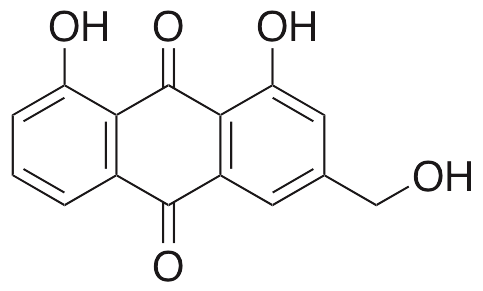Description
Aloe emodin is an anthraquinone found in the aloe plant. Aloe emodin is most commonly known for its stimulant-laxative action, but also shows antioxidative, anticancer chemotherapeutic, and anti-angiogenic activity. This compound activates CFTR Cl- channels in the colon, potentially increasing fluid secretion and resulting in laxative activity. Aloe emodin acts on a number of targets in cellular models of cancer, including p65lck, ERα, NF-κB, and mTORC2. Additionally, aloe emodin induces apoptosis in glioma models through disruption of the mitochondria membrane potential.
